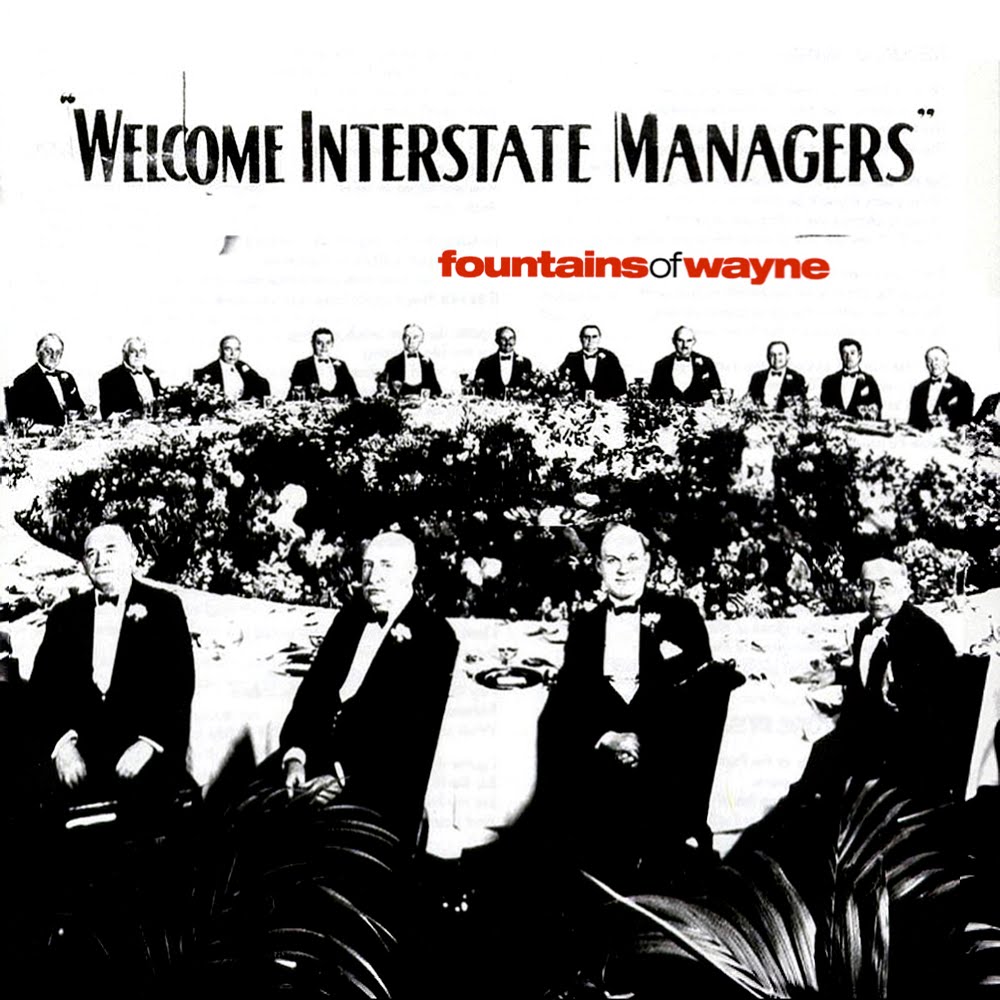Robby has been a teacher for the past 12 years, so I took a page from his educator’s handbook before this assignment by giving him an assessment first. “On a scale from 1 to 10,” I asked, “with 1 being you’ve heard the name and that’s all, and 10 being you know all the words to all their albums, please rate your familiarity with Fountains of Wayne.” His answer: “I have heard of them and I think I have heard one of their songs, so I guess a 2 or 3.” That told me what FoW album to assign.
See, my friend Trish has been singing the band’s praises for a couple of decades, and so when I finally decided to check in with them, it was her I consulted for what album to start with. Her recommendation: Welcome Interstate Managers. So a couple of years ago that album found its way into my life, and I loved it. So much so that I’ve sought out a bunch more of their records and now count myself a fan. If Robby was already a fan too, I might have assigned him one of those later albums, but for a beginner, there’s no better introduction than Welcome.
This album epitomizes the wit, the sparkle, and the pure pleasure that makes Fountains of Wayne such a fun band. Let’s start with the lyrics. Just on a mechanical level, there’s so much cleverness going on here. Rhymes like “I saw you talkin’ to Christopher Walken” or “working all day for a mean little guy / with a bad toupee and a soup-stained tie” demonstrate a wonderful mastery of lyrical forms. “It may be the whiskey talking / but the whiskey says I miss you every day” starts with a cliche and then squeezes the poignancy out of it. “Ever since you hung up on me / I’m hung up on you” is a perfect satire of typical country music wordplay, so perfect it hardly seems like an exaggeration. And could a tune about feeling exploited by the music industry possibly have a better title than “Bought For a Song”?

Then there’s the conceptual level. So often on this album, Fountains Of Wayne takes the emotionally charged pop song structure and applies it in unexpected ways. Take “All Kinds Of Time”, which grafts a U2-like anthem onto a football play, taking an overused game-announcer phrase and turning it into something transcendent. Or how about “Halley’s Waitress”, musically a wistful missing-you soft-rock song, but lyrically grousing about poor table service at a diner? “Fire Island” takes a chorus-starting lyric of “we’re old enough by now to take care of each other”, and builds around it a teen-movie scenario of “driving on the lawn / sleeping on the roof / drinking all the alcohol.”
Such comedy inversions are all over the album, but the band isn’t simply having a laugh. Taken together, these songs form a panoramic picture of early 21st-century suburban male life in New York and New Jersey, in all its ludicrousness and pain, skipping from character to character like a Robert Altman movie. “Little Red Light” drops us into the car with a guy who’s stuck in traffic on the Tappan Zee Bridge, recently dumped, and bemoaning his lack of messages. “Bright Future In Sales” shows a different kind of desperation, an alcoholic salesman who keeps vowing to get his shit together, but never quite seems to get there.
And if the J. Geils Band’s “Centerfold” is the fantasy version of what happens when your childhood crush gets famous, “Hackensack” sounds a lot more like the reality — a guy who works for his dad, scraping the paint off hardwood floors, but promising his now-Hollywood acquaintance, “I will wait for you / As long as I need to / And if you ever get back to Hackensack / I’ll be here for you.” As if she’s ever coming back, and as if she’d want him waiting even if she did.
These marvelous lyrical inventions find themselves polished and set in glorious, glittering musical gold. Fountains of Wayne absolutely nails both the power and the pop, with tender melodies in some places, slamming rock in others, and utterly dazzling harmonies throughout. Pretty much every song is musically excellent, but a particularly superb example is “No Better Place.”
Acoustic rhythm guitar, chiming Byrds-style electric, subtle bass, and powerful drums meld together to form the firmament over which shoot meteoric synth effects. The first verse features Chris Collingwood’s vocals unadorned, but they’re double-tracked on the chorus and thrust aloft by gorgeous chorded backing harmonies. The second verse has Adam Schlesinger singing harmony on lines like “the night-time’s wrapped around you”, setting the loneliness of the lyrics into stark relief. Those intermittent harmonies come in with regularity throughout the song, and they’re a pleasure every time. Schlesinger and Collingwood’s voices fit together like Lennon and McCartney, which is to say both jarringly and perfectly.
Then there’s the bridge, in which the subject of the song seems almost dissociative, and immediately following the line “so you sail between the rooftops and the sky”, a powerful thrumming synth bursts in, rattling bones and raising goosebumps into the guitar solo, which evokes and echoes the narrator’s yearning tone. The last note of that solo carries us into the final verse, in which Collingwood is alone again, with just rhythm guitar and the occasional tambourine hit. Then the electric guitar, drums, and harmonies return to take us to the chorus one final time, everything shimmering and magical as the meteors crowd the sky, slowly fading into the distance.
Every element of the song combines for a symphony of aching pleasure, and every song on Welcome Interstate Managers is full of such treats. If you like rock or pop music at all, there’s something here for you. For me, it’s a tremendous smorgasbord whose delights get deeper with every listen.

Leave a Reply